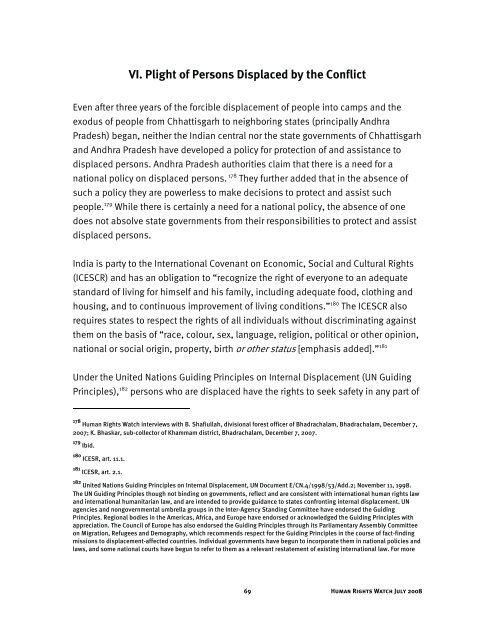âBeing Neutral is Our Biggest Crimeâ - Global Coalition to Protect ...
âBeing Neutral is Our Biggest Crimeâ - Global Coalition to Protect ...
âBeing Neutral is Our Biggest Crimeâ - Global Coalition to Protect ...
You also want an ePaper? Increase the reach of your titles
YUMPU automatically turns print PDFs into web optimized ePapers that Google loves.
VI. Plight of Persons D<strong>is</strong>placed by the Conflict<br />
Even after three years of the forcible d<strong>is</strong>placement of people in<strong>to</strong> camps and the<br />
exodus of people from Chhatt<strong>is</strong>garh <strong>to</strong> neighboring states (principally Andhra<br />
Pradesh) began, neither the Indian central nor the state governments of Chhatt<strong>is</strong>garh<br />
and Andhra Pradesh have developed a policy for protection of and ass<strong>is</strong>tance <strong>to</strong><br />
d<strong>is</strong>placed persons. Andhra Pradesh authorities claim that there <strong>is</strong> a need for a<br />
national policy on d<strong>is</strong>placed persons. 178 They further added that in the absence of<br />
such a policy they are powerless <strong>to</strong> make dec<strong>is</strong>ions <strong>to</strong> protect and ass<strong>is</strong>t such<br />
people. 179 While there <strong>is</strong> certainly a need for a national policy, the absence of one<br />
does not absolve state governments from their responsibilities <strong>to</strong> protect and ass<strong>is</strong>t<br />
d<strong>is</strong>placed persons.<br />
India <strong>is</strong> party <strong>to</strong> the International Covenant on Economic, Social and Cultural Rights<br />
(ICESCR) and has an obligation <strong>to</strong> “recognize the right of everyone <strong>to</strong> an adequate<br />
standard of living for himself and h<strong>is</strong> family, including adequate food, clothing and<br />
housing, and <strong>to</strong> continuous improvement of living conditions.” 180 The ICESCR also<br />
requires states <strong>to</strong> respect the rights of all individuals without d<strong>is</strong>criminating against<br />
them on the bas<strong>is</strong> of “race, colour, sex, language, religion, political or other opinion,<br />
national or social origin, property, birth or other status [emphas<strong>is</strong> added].” 181<br />
Under the United Nations Guiding Principles on Internal D<strong>is</strong>placement (UN Guiding<br />
Principles), 182 persons who are d<strong>is</strong>placed have the rights <strong>to</strong> seek safety in any part of<br />
178 Human Rights Watch interviews with B. Shafiullah, div<strong>is</strong>ional forest officer of Bhadrachalam, Bhadrachalam, December 7,<br />
2007; K. Bhaskar, sub-collec<strong>to</strong>r of Khammam d<strong>is</strong>trict, Bhadrachalam, December 7, 2007.<br />
179 Ibid.<br />
180 ICESR, art. 11.1.<br />
181 ICESR, art. 2.1.<br />
182 United Nations Guiding Principles on Internal D<strong>is</strong>placement, UN Document E/CN.4/1998/53/Add.2; November 11, 1998.<br />
The UN Guiding Principles though not binding on governments, reflect and are cons<strong>is</strong>tent with international human rights law<br />
and international humanitarian law, and are intended <strong>to</strong> provide guidance <strong>to</strong> states confronting internal d<strong>is</strong>placement. UN<br />
agencies and nongovernmental umbrella groups in the Inter-Agency Standing Committee have endorsed the Guiding<br />
Principles. Regional bodies in the Americas, Africa, and Europe have endorsed or acknowledged the Guiding Principles with<br />
appreciation. The Council of Europe has also endorsed the Guiding Principles through its Parliamentary Assembly Committee<br />
on Migration, Refugees and Demography, which recommends respect for the Guiding Principles in the course of fact-finding<br />
m<strong>is</strong>sions <strong>to</strong> d<strong>is</strong>placement-affected countries. Individual governments have begun <strong>to</strong> incorporate them in national policies and<br />
laws, and some national courts have begun <strong>to</strong> refer <strong>to</strong> them as a relevant restatement of ex<strong>is</strong>ting international law. For more<br />
69<br />
Human Rights Watch July 2008
















